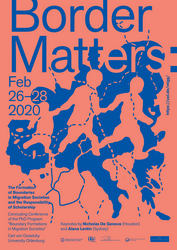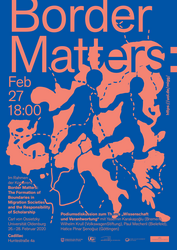Thematic focus
Thematic focus
Border Matters: The Formation of Boundaries in Migration Societies and the Responsibility of Scholarship
Ever since the so-called ‚summer of migration’ of 2015, a central characteristic of migration has become particularly visible in a range of different political and societal spheres and discourses: I.e., practices of crossing boundaries and practices of its prevention are mutually constitutive dimensions of socio-political transformation. In other words, migration destabilizes orders of difference and belonging and mobilizes forces of their re-stabilization at the very same time. In a range of different contexts in migration societies – e.g., at the borders of Europe, in parliamentary debates, in train stations and supermarkets as well as in classrooms at schools and universities – we witness increasingly hostile attempts at demarcating the self from the other, which give ample proof of the strong impact of national, ethnic and/or cultural boundaries beyond the borders of the nation state. At the same time, the urge of redrawing exactly these lines of demarcation in order to safeguard what is considered to be ‘one’s own identity’ finds expression in the resurgence of right-wing and populist parties and movements in different regions of the world. In analogy to these societal dynamics, one can also observe a re-nationalization of territorial borders – a development which, according to Étienne Balibar’s, goes hand in hand with the demarcation of citizenship and thus also sets the limits of democratic participation.
In view of this mutually constitutive relationship between the formation of boundaries and the constitution of orders of difference and belonging in migration societies, the conference pursues two goals: First, it explores the processes of producing national, ethnical, and/or cultural boundaries in different historical and regional contexts. It examines the discourses and practices of ‚doing border’ (e.g. in governmental or non-governmental organizations in the context of the European border regime) and their effects (e.g. in the constitution of the ‚migrant’ or the ‚refugee’ subject). In so doing, the conference aims at illustrating that and how boundaries as well as orders of difference and belonging are (re)produced and (re)negotiated in a range of different societal constellations. Second, following the self-reflexive stance of critical migration studies, the conference also sets out to discuss in how far scholarship in this field contributes to the formation and transformation of boundaries in migration societies. I.e., how do (which) perspectives in migration studies reproduce specific notions and orders of difference and belonging – e.g. through a specific theoretical approach, terminology or methodology? What is the role and responsibility of migration researchers with regard to the current political situation? Can they still refrain from political intervention considering the growing nationalist and racist tendencies? Are they not asked to work against these tendencies through their scholarship?
Against the backdrop of these observations and considerations, the conference is to be understood both as a site of presenting and discussing scholarly work on practices and discourses of (trans)forming boundaries in migration societies and as a site of reflecting on one’s own position and responsibility as researcher. In order to establish a dialogue between these two concerns, it invites speakers from different disciplinary backgrounds to present theoretical and methodological consideration as well as case studies from their respective fields of inquiry.




